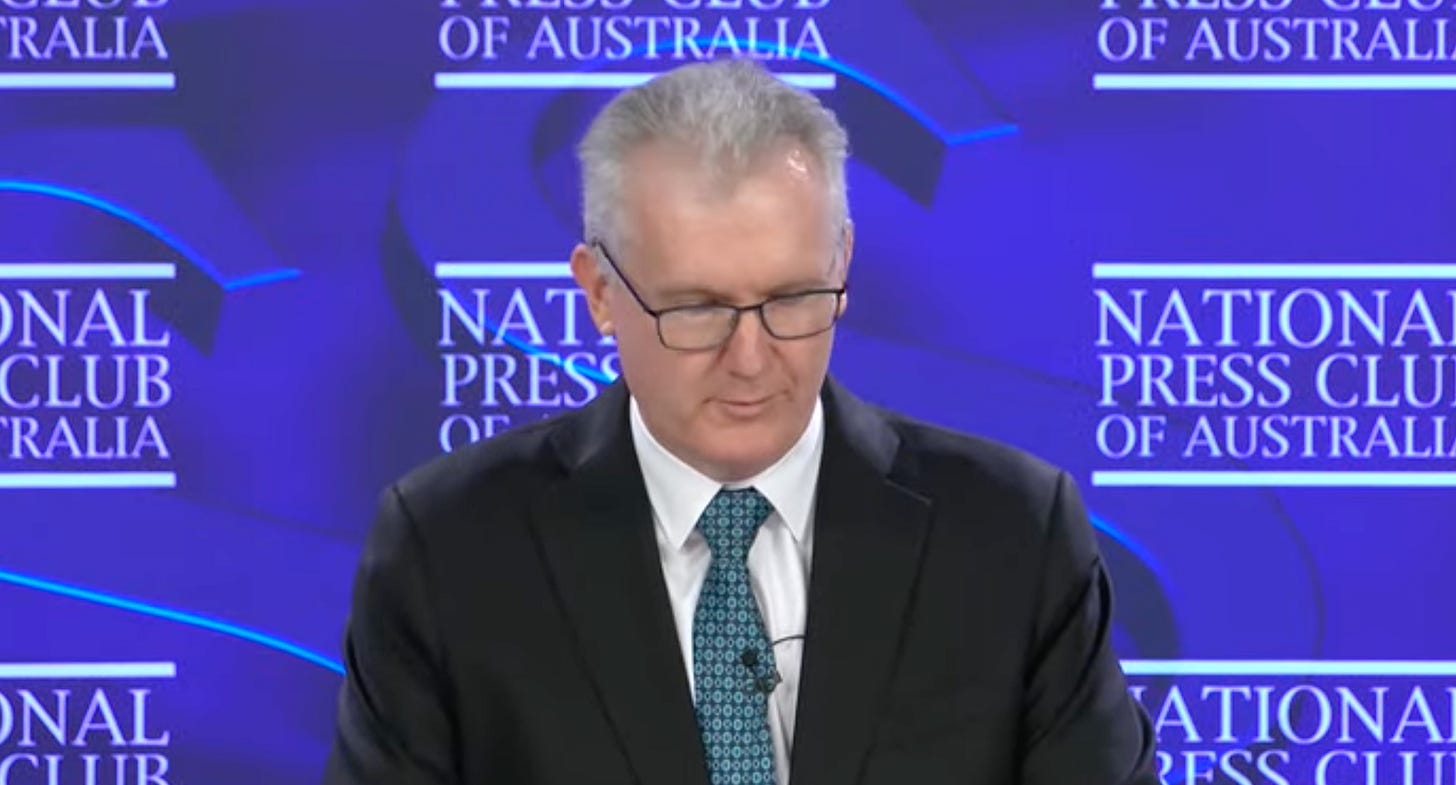Overseas Students Exploited in Bank Account Mule Schemes, Minister Warns as 22,000 Accounts Closed
This piece is freely available to read. Become a paid subscriber today and help keep Mencari News financially afloat so that we can continue to pay our writers for their insight and expertise.
Today’s Article is brought to you by Empower your podcasting vision with a suite of creative solutions at your fingertips.
Australian banks closed 22,000 mule accounts in the last financial year after overseas students sold access to their banking credentials to organized crime networks, Home Affairs Minister Tony Burke revealed Thursday, announcing new measures to combat what he described as sophisticated criminal exploitation of international education.
Burke used his National Press Club address to issue urgent warnings to international students about recruitment schemes targeting those preparing to leave Australia. Criminal organizations offer departing students substantial payments in exchange for their bank account details, with the promise that students will be out of the country when the accounts are used.
The schemes create significant challenges for law enforcement because previously legitimate accounts with years of transaction history suddenly become vehicles for criminal activity. Accounts that have been completely legitimate for three years, for five years, sometimes for longer, are now in the hands of organized crime, Burke explained.
Truth matters. Quality journalism costs.
Your subscription to Mencari directly funds the investigative reporting our democracy needs. For less than a coffee per week, you enable our journalists to uncover stories that powerful interests would rather keep hidden. There is no corporate influence involved. No compromises. Just honest journalism when we need it most.
Not ready to be paid subscribe, but appreciate the newsletter ? Grab us a beer or snag the exclusive ad spot at the top of next week's newsletter.
Scale of the Problem
The 22,000 account closures represent only cases where banks successfully identified and terminated mule accounts. Burke suggested the actual scale of exploitation likely exceeds detected instances, as criminal networks continuously refine their methods to avoid triggering banking security protocols.
Signs advertising easy money opportunities appear prominently near universities, particularly in capital cities. Burke described typical recruitment materials featuring tear-off phone numbers and promises of substantial payments for minimal effort.
The minister stressed that international students face serious legal consequences for participating in these schemes, even unknowingly. Beyond criminal liability, students who hand over banking credentials enable some of the most serious crimes operating in Australia.
“Not only are you breaking the law in doing that, but you are also creating a situation where you are probably providing a means for child exploitation, for drug trafficking, for some of the worst elements of organized crime,” Burke stated.
Criminal Operations and Impact
The mule account problem intersects with broader organized crime infrastructure that Burke detailed in his address. Criminal networks use these accounts to process funds from scams, drug trafficking, human trafficking, and child exploitation operations.
Traditional methods of tracking financial crimes rely on identifying suspicious accounts and transaction patterns. However, when criminals gain access to accounts with established legitimate histories—including regular international deposits characteristic of overseas student accounts—standard detection methods become less effective.
Instead of the different points where we know to be able to look for financial transactions, we have accounts that have never been previously used for these purposes but have received international deposits because they’re overseas students, Burke said.
Government Response: Immigration Data Sharing
Burke announced he is updating the Visa Entitlement Verification Online terms and conditions to grant financial institutions access to immigration data when investigating suspected mule accounts.
Under the new arrangement, banks that identify accounts behaving suspiciously can verify whether account holders have left Australia. This cross-referencing capability addresses a critical information gap that previously prevented banks from determining if accounts had been sold by departing students.
“The banks want to help with this, but at the moment, the banks, if they think there’s something suspicious, don’t have access to the immigration data to work out if this account that’s behaving quite differently belongs to somebody who’s meant to have left the country,” Burke explained.
The minister emphasized that financial institutions would access immigration information only when investigating specific suspicious accounts, not as blanket surveillance of all international student banking activity.
Public Awareness Campaign
Beyond regulatory changes, Burke stressed the importance of public messaging to international students. He announced he has written to university peak bodies requesting their assistance in communicating the risks and consequences of mule account schemes.
The minister acknowledged that many students targeted by these operations may not fully understand the severity of their actions or the criminal enterprises they would be supporting. Educational institutions have direct relationships with international students and can deliver warnings more effectively than government agencies alone.
Burke noted that part of his motivation for announcing these measures at the National Press Club was ensuring media coverage would reach international student communities through news reports and social media.
Australian Banking Association Collaboration
The Australian Banking Association raised mule account concerns directly with Burke’s portfolio, joining security agencies in pushing for stronger intervention frameworks. Banks have expressed frustration about their limited ability to address accounts they suspect are compromised.
Financial institutions must balance customer privacy protections with fraud prevention efforts. The immigration data-sharing arrangement provides a legal mechanism for targeted information access while maintaining broader privacy safeguards.
Burke emphasized that banks actively want to combat mule accounts but require government cooperation to access information held by separate agencies. The portfolio consolidation placing both home affairs and immigration responsibilities under one minister enabled this integrated solution.
Convergence of Threats
The minister framed mule accounts as exemplifying the convergence of previously distinct security challenges—a central theme of his address. What increasingly has been happening has been overseas students in particular have been told, okay, you’re leaving the country soon, before you leave, give us your bank account details, we’ll give you a heap of money, you’ll be out of the country, we’ll use your bank account.
This exploitation combines immigration policy, financial crime, cybersecurity, and transnational organized crime in ways that would have appeared unconnected two decades ago. Burke argued that modern enforcement requires unified portfolio architecture capable of addressing intersecting threats.
International Student Welfare
The announcement raises questions about broader protections for international students, who represent a significant economic sector for Australia. The international education industry is one of Australia’s largest export earners, generating billions in annual revenue.
Burke noted that international education is “one of the only industries in Australia, one of the only ones where you need to provide a new home for every customer”—a comment made in discussing housing policy but relevant to student welfare more broadly.
The government recently implemented changes requiring educational institutions to demonstrate adequate student housing capacity, addressing concerns that institutions had outsourced housing responsibilities to already-stressed rental markets.
Implementation and Enforcement
The Visa Entitlement Verification Online system already exists as infrastructure for immigration status checks. Burke’s regulatory update expands permissible uses to include financial institution inquiries about suspected mule accounts.
Banks will need to establish internal protocols for when to request immigration data and how to handle information received. The arrangement likely includes safeguards preventing misuse of immigration information for purposes beyond mule account investigation.
Burke did not specify when the updated terms and conditions would take effect or whether additional legislation might be required. The minister suggested the changes could be implemented through administrative updates rather than parliamentary approval.
Organized Crime Business Model
The mule account problem reflects organized crime’s adaptation to enforcement pressure. As authorities improve detection of traditional money laundering methods, criminal networks seek new channels with less scrutiny.
Recruiting departing international students offers multiple advantages to criminal organizations: access to established legitimate accounts, reduced risk of immediate detection, and victims unlikely to cooperate with Australian authorities after leaving the country.
Burke connected the mule account measures to his broader announcement about crypto ATM restrictions, emphasizing that disrupting any element of organized crime’s financial infrastructure creates cascading effects across connected operations.
Sustaining Mencari Requires Your Support
Independent journalism costs money. Help us continue delivering in-depth investigations and unfiltered commentary on the world's real stories. Your financial contribution enables thorough investigative work and thoughtful analysis, all supported by a dedicated community committed to accuracy and transparency.
Subscribe today to unlock our full archive of investigative reporting and fearless analysis. Subscribing to independent media outlets represents more than just information consumption—it embodies a commitment to factual reporting.
As well as knowing you’re keeping Mencari (Australia) alive, you’ll also get:
Get breaking news AS IT HAPPENS - Gain instant access to our real-time coverage and analysis when major stories break, keeping you ahead of the curve
Unlock our COMPLETE content library - Enjoy unlimited access to every newsletter, podcast episode, and exclusive archive—all seamlessly available in your favorite podcast apps.
Join the conversation that matters - Be part of our vibrant community with full commenting privileges on all content, directly supporting The Evening Post (Australia)
Catch up on some of Mencari’s recent stories:
It only takes a minute to help us investigate fearlessly and expose lies and wrongdoing to hold power accountable. Thanks!








